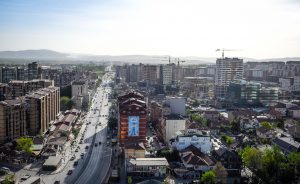Advertisements for Huawei are ubiquitous in Europe. In Skopje, the capitol of North Macedonia, a massive electronic sign for Huawei towers above the central square. A similarly large Coca-Cola sign looms over a statue of what any local will tell you is Alexander the Great that dominates the square. Officially the figure is known as “Warrior on a Horse” in order not to inflame Greek sensibilities.
Yet, the streets of another capital city in the western Balkans just a little over an hour’s drive to the north is entirely devoid of Chinese products.
Over lunch, in a traditional Kosovar restaurant, a senior government official reflects on China’s role in the country.
“China doesn’t play a big role here. There are some Chinese individuals just involved in textiles and some individual merchants,” says Nebi Halil, who heads legal affairs for Kosovo’s penitentiary system, over lunch in Pristina. Halil has held a variety of roles in Kosovo’s bureaucracy. He is joined at lunch by a United Nations bureaucrat who nods in agreement regarding China’s minimal influence.
Chinese influence around the globe is growing fast but not so much in Kosovo. China has shunned Kosovo in favor of Serbia, where, alongside Russia, China is one of the main boosters. Beijing looked on disapprovingly as a NATO-led bombing campaign, known as “Operation Allied Force” decimated Yugoslavia in 1999. On May 7, 1999, a U.S. bomb hit the Chinese embassy in Belgrade, killing three Chinese media workers. The incident, which was later determined to have been a mistake, caused a breach in Sino-American relations and has had echoes down to the present.
In 2008, Taiwan recognized Kosovo’s independence despite China’s condemnation of the move. China continues to support a resolution via dialogue under the terms of United Nations Security Council Resolution 1244 to solve the crisis. Today, Kosovo’s non-recognition matters. Along with Taiwan, is not a formal member of the World Health Organization at a time of an unprecedented public health crisis in the form of COVID-19. Underlying this point, Kosovo was the only country in the Western Balkans that China did not send medical aid to after the outbreak of the pandemic, as part of its “face mask diplomacy.”
The massive Huawei sign in Skopje, North Macedonia is just an hour and a half south of Pristina, the capital of Kosovo, by taxi. China has remained committed to Serbia, as well. After U.S. Steel sold a Serbian steelworks back to the government for $1, substantial Chinese investment has turned the facility into the delight of its remaining Serbian workers. Yet, this is just one example of growing Chinese influence in the Balkans. While many in Kosovo would love to see their country recognized by China, the case of neighboring Montenegro offers a cautionary tale. Montenegro’s debt to GDP rose 70 percent after it took an 809 million euro loan from China’s Export-Import Bank to build a highway through its mountainous terrain, the construction of which is ongoing.
Enter Japan.
Earlier this year following a meeting of heads of state, Japanese Prime Minister Shinzo Abe announced plans to open a Japanese embassy in Kosovo. Japan’s announcement is unprecedented in its diplomacy with unrecognized states, though Japan has flirted with limited recognition of Palestine and has a consulate in Taipei.
“Kosovo needs the free and open international order that Tokyo is now promoting globally,” wrote Kuni Miyake, the research director at Canon Institute for Global Studies in an op-ed published in the Japan Times late last year.
Geopolitics aside, many Kosovars are excited to see their two countries grow commercial, as well as diplomatic, ties.
“Japanese tourists love Kosovo and in particular our wines,” says Saranda Shala, who works with the Wine Tourism Association of Kosovo. “I meet with them when they come here. I am pleased to see they are sharing images on social media about Kosovo months after visiting.”
Shala, who volunteered in refugee camps in 1999, later earned a certificate in tourism promotion from JICA, the Japanese development agency. JICA has been quite busy in Kosovo. One of its most visible projects involves funding for a new air quality monitoring system in Pristina. Earlier this year a graphic monitor on Pristina’s busy Mother Teresa Street informed citizens of the mountainous country of the daily air quality measurements.
Hirano Mushrooms, located in Mitrovica, is the largest Japanese business in Kosovo at present and is also the largest farm growing Japan’s iconic shiitake mushroom in Europe. Kosovo’s stores and shops are devoid of products made in China, with most of the goods on sale coming from Turkey or elsewhere in the Balkans. Even though China officially shuns Kosovo, one can find Kosovo flag covers for Huawei phones on sale in shops in the republic.
China may be absent, but its power might impact Kosovo in other ways. China may be playing a role behind the scenes in support of Serbian efforts to undermine Kosovo’s recognition by Africa Union member states. Togo, the Central African Republic, Ghana, and now Sierra Leone have all ended their recognition of Kosovo in the past decade. Kosovo was also blocked from INTERPOL membership largely by the votes of African states. According to Kosovar officials, heavy last-minute lobbying from the Serbian officials may have tilted the scales.
Yet, it is China, the largest trading partner for most countries in Africa, whose voice could be decisive in these matters and could be useful for Kosovo. China and Russia stand as impediments to Kosovo.
“We know very little about both countries in Kosovo. Japan is both very friendly and supportive of Kosovo – unlike China,” says Besa Ismail, a member of parliament in Kosovo for the Democratic Party of Kosovo. “But, in the long term, we need to change that and work with all countries.”
Joseph Hammond is a former Fulbright fellow and journalist who had reported extensively from the Middle East, Asia, and Africa.

































